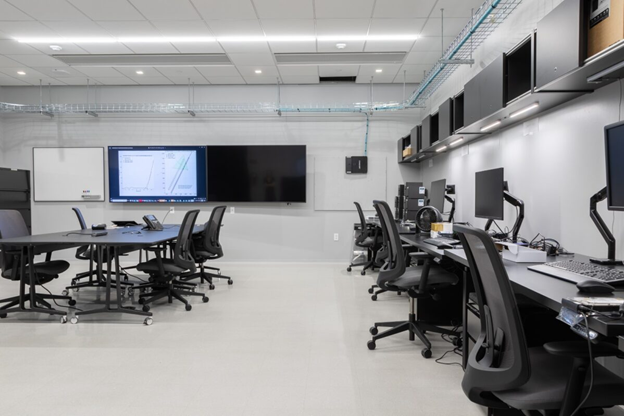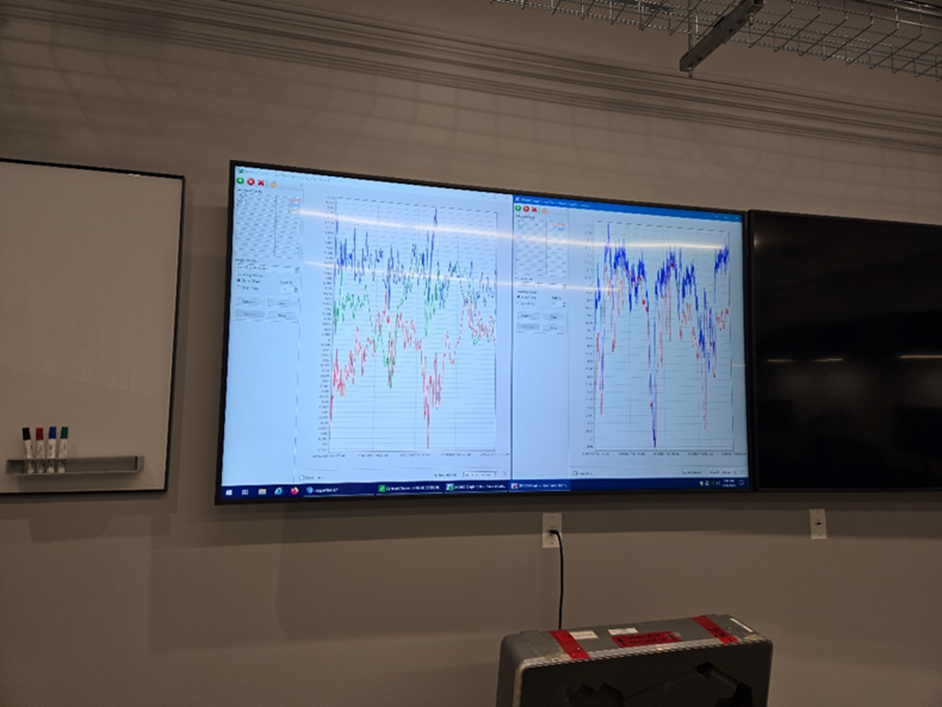PNT and Spectrum Lab

The U.S. DOT Volpe Center’s Positioning, Navigation, and Timing (PNT) and Spectrum Lab provides the large-scale remote data collection and processing capabilities that enables the analyses of data-driven assessments for the various safe reduction of wake turbulence separations. The assessments include the integration of new entrants from the wake perspective such as Unmanned Aircraft Systems (UAS) and Urban Air Mobility (UAM) aircraft, as well as identify wake mitigation procedures and system designs for traditional aircraft already in operation.
The PNT and Spectrum Lab also serves as division-wide space for the Aviation Weather and PNT Applications Division. The lab space provides a staging and developmental area for instrumentation and data collection systems across a wide variety of projects within the Aviation Weather and PNT Applications Division. These systems include atmospheric sensors—both for wake turbulence research and for broader aviation weather applications, including visibility sensing for Runway Visual Range (RVR) applications—and PNT instrumentation, like GPS receivers, inertial measurement units, and other sensors related to automated vehicle operations.
With live remote connection to test sites in San Francisco International Airport and John F. Kennedy International Airport, the PNT and Spectrum Lab acts as a data control hub for the remote test sites. Data from remote test sites are efficiently and securely uploaded to the U.S. DOT Volpe Center’s Secure File Transfer Protocol (SFTP) server and brought to the lab for data processing purposes.
Additionally, the PNT and Spectrum Lab can be used for prototyping data analysis/processing for a suite of sensors and performing data calibration and quality assurance for sensor installed in the field.
To further support testing activities, the U.S. DOT Volpe Center also operates the nationally recognized Aviation Weather Research Facility (AWRF) located on Joint Base Cape Cod.
Inside the PNT and Spectrum Lab
The Aviation Weather and PNT Applications Division has many capabilities in terms of data processing and analysis based on the data collected and tools created by staff. Some of these capabilities include:
- Assessment of wake risk under different separation standards
- Remote monitoring and management of wake turbulence, meteorological and surveillance data collection
- Data archiving and processing of publicly and privately sourced data
- Meteorological Data Collection and Reporting System (MDCRS)
- Rapid Refresh (RAP)
- Performance Data Analysis and Reporting System (PDARS)
- Airport Surface Detection Equipment, Model X (ASDE-X) and Airport Surface Surveillance Capability (ASSC)
- Automated Surface Observing Systems (ASOS)
- Data processing, raw data archival and sensor/equipment preparation
- WindTracer Lidars
- Sonic Anemometers
- Thermocouples
- MTP-5 Temperature Profiler
- Halo Lidars
The PNT and Spectrum Lab has five workstations which each have been designated for specific tasks. The Lab will have a direct feed into the U.S. DOT Volpe Center’s Demilitarized Zone (DMZ) and Secure File Transfer Protocol (SFTP) Server assigned to the Aviation Weather and PNT Applications Division for data processing and analysis of data collected directly from the remote test sites. Additionally, the PNT and Spectrum Lab has direct access to remote test sites currently collecting data for FAA’s Wake Turbulence Research Office, but the data transfer capability is not restricted to wake turbulence effort in theory.
Learn more about our Aviation Weather and PNT Applications team.

